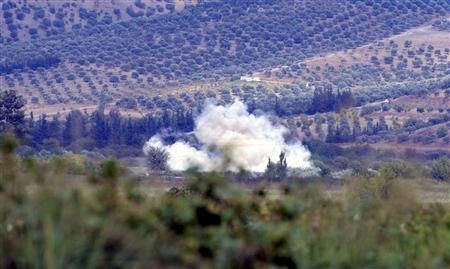Turkey Frets Over Economic Impact As Syrian War Hits Home

ISTANBUL -- For business owners in Turkey’s southern Hatay province, the sound of a phone used to be a welcome signal of commercial prospects. But now, since the onset of the crisis in neighboring Syria, more than one year and a half ago, when the phone rings it’s usually for one thing: people asking for help.
The influx of refugees from Syria into Hatay has all but halted local business, according to local real estate broker Bilal Tasoz, who said nowadays everyone’s business is to provide aid for those coming in. Last week, the government of Prime Minister Recep Tayyip Erdogan announced that Turkey had reached its “psychological limit,” underscoring that the country would not be able to cope if the surge continued at this pace. There are now almost 275,000 Syrian refugees in neighboring countries, including 101,000 in Turkey, according to the United Nations.
“They say there are 100,000 refugees, but I think there is a lot more,” said Tasoz. “Hospitals are overflowing, so we have forgotten about business, and instead we do our best to help as many people as we can.”
Now, businesspeople in Hatay are asking the government for help.
Before the crisis, up to $2 million per day flowed into Hatay from tourism, according to local hotel owner Rasim Narin. Now, many shops, hotels and local business have had to shut down amid the humanitarian crisis.
Tasoz said no one is spending for real estate anymore, even after Turkish officials moved Syrian tenants, who were paying rent to live in the province, back into refugee camps near the border.
“The Syrians who had saved gold and money came to us to escape the camps and rent houses, but after tensions started mounting with the local people, police pushed them out, and now the houses are empty,” said Tasoz.
Besides the missed revenue, there is also spending by the authorities to feed and shelter the displaced Syrians, who are fleeing a civil war that has killed tens of thousands by all international estimates. Turkish Finance Minister Mehmet Simsek said the central government has spent 400 million Turkish liras, or around $220 million, so far to help Syrian refugees, but he estimated that spending by the affected municipalities is much higher.
Ali Yücelen, chairman of the Young Business Association of Turkey, or Tugiad, has asked the government to extend the tax deadline for local business in Hatay. “The tax liabilities owed by businessmen who used to trade in Syria and Libya were postponed ... last year. We would like the same law to be implemented for the local business owners in Hatay who have been in deep economic crisis because of the political crisis with Syria,” said Yücelen, speaking at a press conference.
“I respect the political decisions made for Turkey’s sake, but the burden of the economic losses should be shared,” he added.
Hatay’s direct export volume in 2010 was $118 million, according to Tugiad; it has plunged to $33 million in the first seven months of 2012. Yücelen said the government should also provide local shopkeepers and business owners with short-term work subsidies while the crisis continues.
But it is not just Hatay that is bearing the economic burden of Syria’s war. The upsurge of violence in Syria has increased military operations across the border, leading the Turkish armed forces to move armored vehicles and conduct more patrol flights. The costs of those security operations are adding up.
Ninety percent of Turkish exports to the Middle East, primarily to Saudi Arabia, Jordan, Qatar and the United Arab Emirates, used to pass through Syria, according to economist Gungor Uras. The war has halted that flow.
The recent closure of Syria’s airspace also comes with a heavy price tag. Flights from Turkey to the Middle East used to fly over Syria, but now they have been rerouted, and planes flying to destinations in the region are burning an average of $1,500 more in fuel per flight.
And on top of all that, there’s the risk that Syria’s war may spill into Turkey.
“We are all family here. I don’t think locals will leave Hatay unless bombs start dropping, but now there is no hope for business as no one is investing,” said Tasoz. “Everyone is just waiting to see what will happen.”
© Copyright IBTimes 2025. All rights reserved.





















